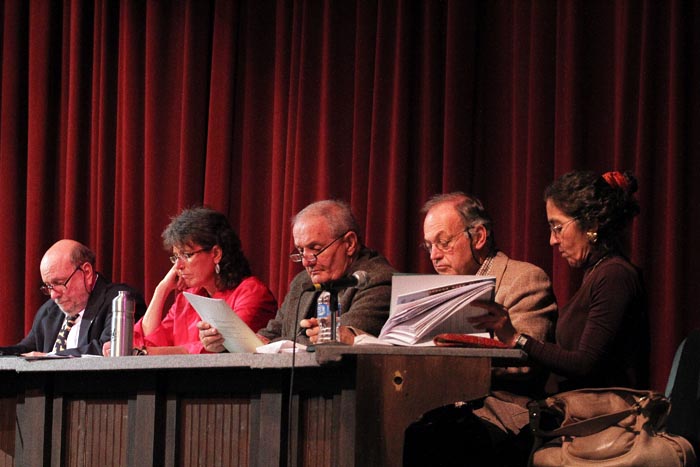Just months after having to cut nearly a quarter million dollars from its fiscal year 2011 budget at the insistence of the Massachusetts Department of Revenue, Oak Bluffs voters approved a nearly $25 million budget with little discussion at Tuesday night’s annual town meeting. The budget contained cuts to services and personnel, and if passed alone, town administrator Michael Dutton explained, would leave paving undone and no money to pay for a number of unfilled town positions, including finance director, two teaching aide positions at the Oak Bluffs School and a contract employee at the shellfish department.
Voters agreed to place on the May 26 ballot two separate override questions to restore those cuts.
“We’ve done it so that if the overrides fail we’ll still have a budget that works and we won’t have to come back to a special town meeting,” said Mr. Dutton on Tuesday.
A year after a town meeting that stretched into a second week and saw voters reject 11 of 12 Proposition 2 1/2 overrides, the new strategy seems to have worked. When the proceedings wrapped up just before 11 o’clock in a single night, voters filed out of the Performing Arts Center with visible relief.
The evening began with a quorum of 188 voters at 7 p.m. Five articles on a special town warrant were quickly disposed of; voters approved transferring $65,558 from the stabilization fund to supplement underfunded line items and a further $20,000 to remove contaminated soils from Circuit avenue extension. An article to spend $50,000 to repair the library’s HVAC system was withdrawn, as Mr. Dutton explained the town was awaiting pricing for the job.
Voters then turned to the town meeting warrant, article one of which was the approval of a $24.6 million budget that selectmen have described as bare bones. Some voters were caught by surprise when Oak Bluffs resident Charlie Miner made a motion to approve the budget in its entirety without reviewing it line by line, citing the work in previous weeks by the selectmen and Mr. Dutton in paring down the budget.
“So what Charlie just proposed is that we vote this entire budget now, just vote it right through without any questions?” Catherine Deese asked. “I don’t think that’s a good idea, Charlie.”
After a half-hour argument about the merits of voting the budget as a whole, moderator Dave Richardson called for a vote and it carried.
Next voters approved placing two override questions on the May 26 ballot totaling $484,361, including $230,000 in paving costs that highway superintendant Richard Combra lobbied for on the town meeting floor.
“If we don’t approve this money this will be the third year in a row that we’ve delayed any major repairs to our infrastructure,” he said. “Every year that we delay paving and repairs to our infrastructure the costs go up.”
Mr. Combra said in 2004 the cost per ton of asphalt was $62.45; it now stands at $117.60.
The second override question approved for the May ballot includes $75,000 for a new town finance director, $50,000 for two teaching aide positions at the Oak Bluffs school, $15,000 for a contract employee at the shellfish department and a number of other items selectmen were forced to cut from this year’s budget, from patrolmen’s salaries to library expenses.
When voters took up $632,000 in new Community Preservation Act spending, including $200,000 for the recently formed Oak Bluffs Affordable Housing Trust, discussion veered into a protracted and often confused discussion of the various Island affordable housing organizations. Oak Bluffs Affordable Housing Committee chairman and town selectman Ron DiOrio clarified what the $200,000 would pay for.
“The current plan is to model what was done with the old library and do that for scattered-site rental houses of approximately 900 to 1,000 square feet,” he said. Unlike the library project, which created three affordable housing units on top of a new pharmacy, the town would build four new rental houses for $100,000 each, a figure Mr. DiOrio said he hoped would be matched by state and federal grants. He conceded that cuts to community development funding in the most recent federal budget passed last week could complicate those plans. The town is in the process of purchasing a lot that abuts the library and Mr. DiOrio said the committee was currently identifying three town properties for additional affordable housing units. Last year town meeting appropriated $100,000 for the trust. Tenants of the affordable housing units, who Mr. DiOrio said would earn 80 per cent or below of median income, would pay rent to the town.
Oak Bluffs resident Bo Fehl was skeptical of the plan.
“You’re asking us Oak Bluffs residents to put our trust in your trust,” he said. Voters approved the $200,000 appropriation, along with $432,000 in additional Community Preservation Act money for engineering studies of Sunset Lake and Niantic Park, lantern restoration, a Massachusetts Estuaries Project study of Oak Bluffs harbor and Sunset Lake, and rental assistance to the Dukes County Regional Housing Authority.
The only article of the night that was defeated was a complicated zoning change that would lessen setback requirements for pre-existing, nonconforming properties in the R-1 district. The article was crafted to assist homeowners renovating such lots, but historical commission chairman David Wilson warned voters that the zoning changes could promote an erosion of the town’s historic character.
“If you look at the difference between downtown Oak Bluffs and downtown Edgartown, I don’t know how many of you have been by some of the streets in Edgartown recently where there are up to three historic homes being demolished on each street, some of them hundreds of years old; it’s very, very depressing,” he said. “One of the reasons for that is that the setbacks are much more liberal in the heart of Edgartown than they are in our town and so people with money are taking advantage of that. The way they do that is they demolish what’s there and they build the biggest possible building they can. It looks very nice and it’s very expensive but it’s actually a theme park home and not a real historic home.”
After defeating the zoning changes, voters turned their attention to the Cottage City Historic District, which had an article on the warrant to include the historic Denniston House within its boundaries. The building, which was the site of the Island’s first African American church, is not contiguous with the district. The move would add one more layer of review to the site which is already under review by the Martha’s Vineyard Commission and has been designated as “preferably preserved” by the historical commission. In November the town commission blocked the proposed demolition of the house for six months. Island Affordable Housing Fund director T. Ewell Hopkins, whose organization currently has a $750,000 mortgage on the property and had applied for demolition at the request of buyers, did not object to the move. Afterward he explained:
“My concern was if this was spot zoning I was in opposition, but the committee demonstrated that they have been interested in the historical designation for a number of years,” he said. “The demolition permit is totally independent . . . If the owner of the property chooses to demolish the property this designation in and of itself doesn’t decide or not decide if that can happen. At the end of the day all it does is it allows another group to the table to be part of the discussion. The more the merrier, I’m all for transparency.”







Comments
Comment policy »